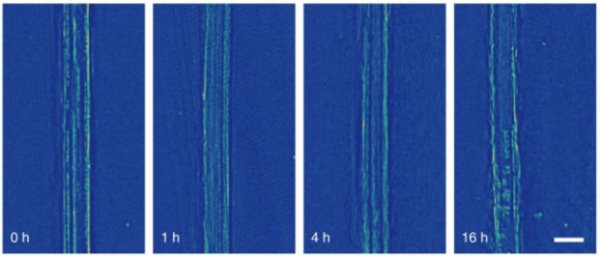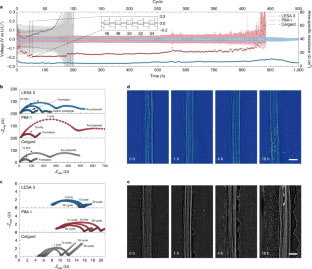Foreign media reported that scientists at the Lawrence Berkeley National Laboratory in the United States have developed a new type of electrolyte that is expected to greatly increase the range of electric vehicles. By replacing the graphite material in the anode of a lithium battery with pure lithium metal, it is expected to achieve new breakthroughs in energy density and charging speed. In addition, the new electrolyte made of soft and solid materials can effectively inhibit the growth of dendrites that cause serious damage to battery performance.

X-ray image of battery anode with smooth surface (from: Berkeley Lab)
Because of its excellent energy density, lithium metal has high hopes in the energy industry. Through continuous improvement, pure lithium metal electrodes are expected to increase the battery capacity to 10 times the current capacity and greatly reduce the time required for charging.
However, the biggest obstacle in front of scientists is the dendrites that can seriously damage the battery performance. When the battery is charging and discharging, this annoying structure will be formed on the graphite anode, which will eventually lead to failure of the lithium battery and even fire.
Many battery research projects focus on how to inhibit the growth of these dendrites. Recently, however, we have seen some promising solutions.
These measures include incorporating a protective layer into the anode to prevent dendrite growth, or using carbon nanotube scaffolds to achieve the same effect, or even introducing tape into the mixture.

Research map (from: Nature Materials)
The good news is that the team of scientists at Lawrence Berkeley National Laboratory and Carnegie Mellon University has come up with new answers on the new soft solid electrolyte.
It is reported that the electrolyte aims to promote the movement of ions back and forth between the battery poles. However, for lithium metal batteries, the research team chose soft and porous polymer materials and filled the micropores with nano-ceramic particles.
Through X-ray imaging technology to carry out up to 16 hours of observation, laboratory tests have shown that this soft and solid electrolyte solution has great advantages. During the entire test, the electrode surface remained fairly smooth.
In another control group that did not use the so-called PIM composite electrolyte material, the researchers observed signs of dendrite growth at an early stage. Looking to the future, it hopes that the new technology will help greatly increase the battery density of electric vehicles.
Details of this research have been published recently in the journal Nature Materials.
Alpha Olefin Sulfonate,Alpha Olefin Sulfonate Chemical,Alpha Olefin Sulfonate Powder,Alpha Olefin Sulfonate Liquid
XINGZHILIAN BIOLOGICALR&D CO.,LTD , https://www.xzlsdslds.com